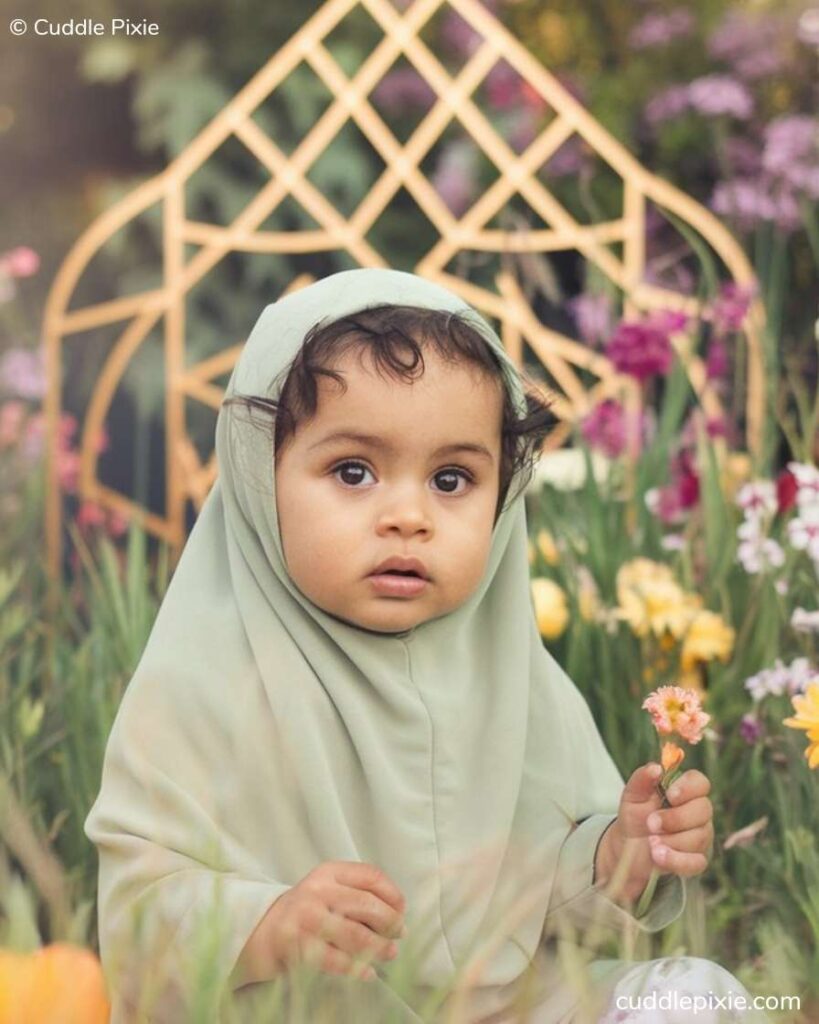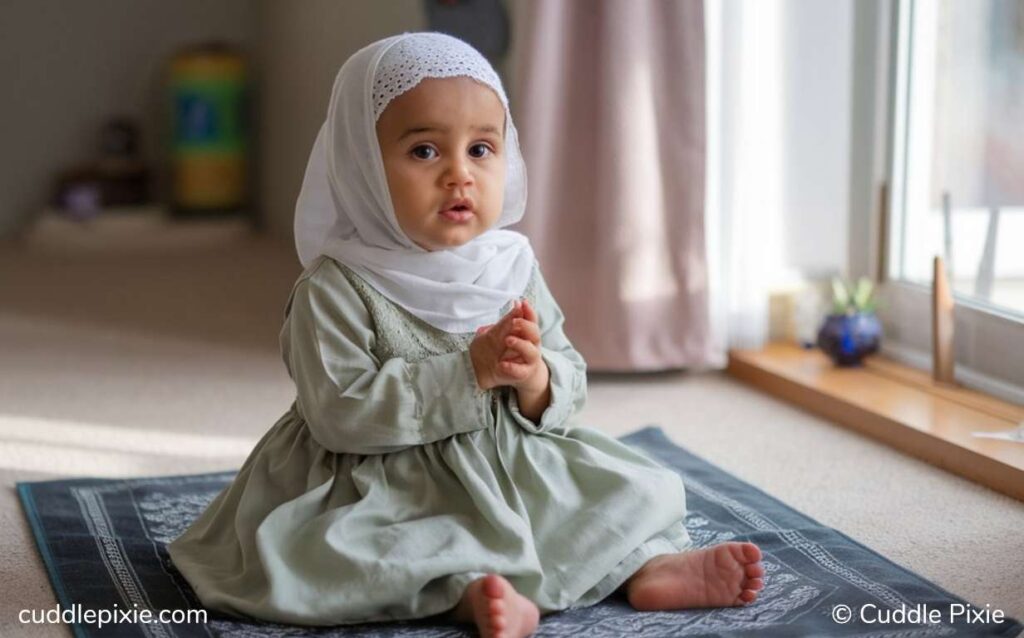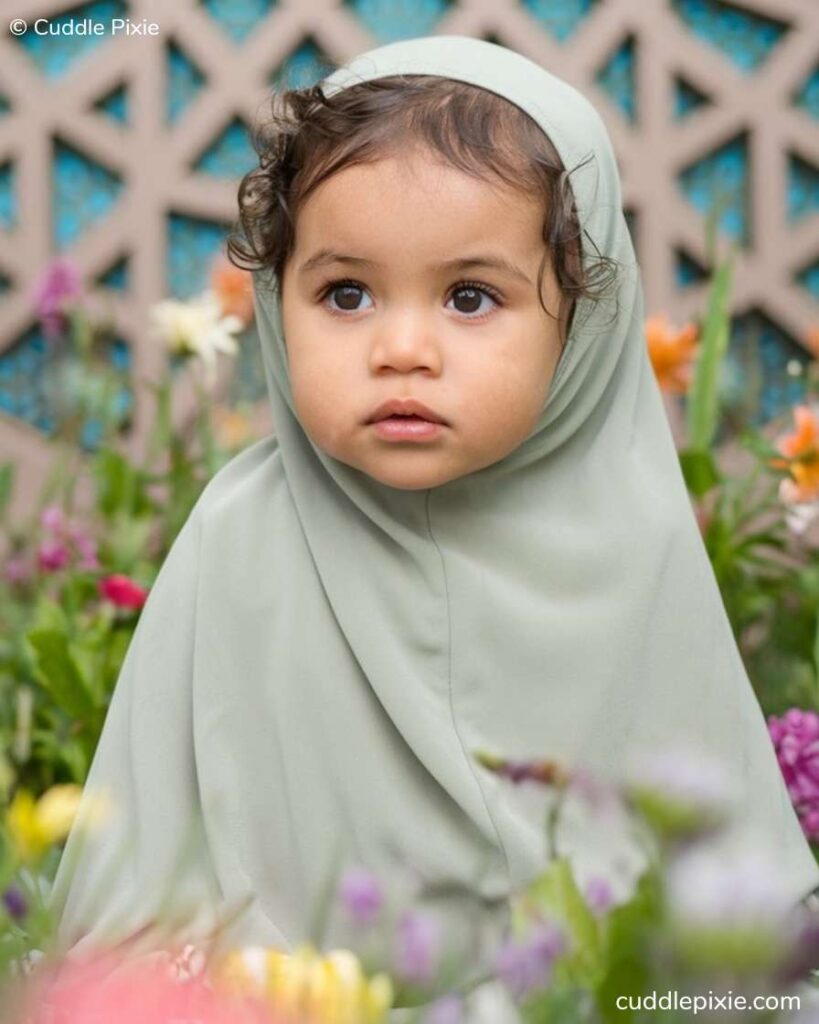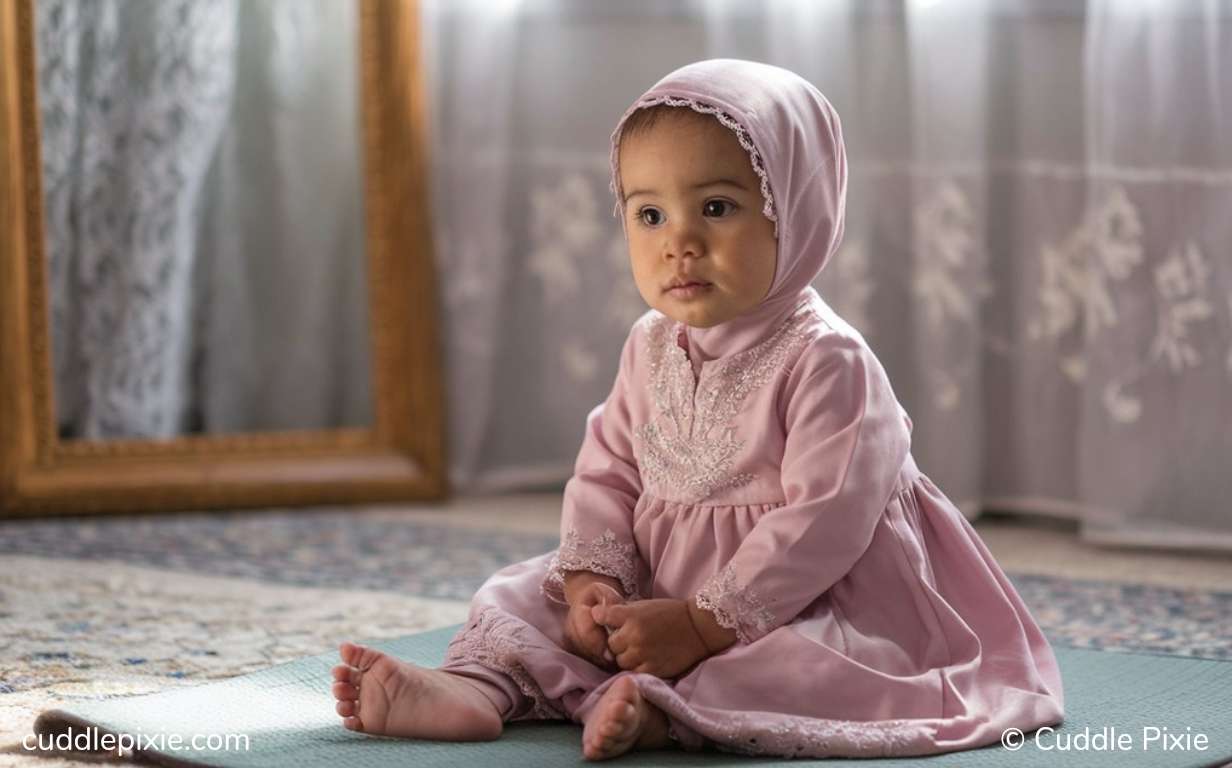Choosing a name for your baby girl is one of the most significant decisions you’ll make as a parent. In Islam, names hold great meaning, often carrying legacies of history, faith, and culture. One rich source of inspiration is the Sahabiyat—the revered women who were companions of Prophet Muhammad (PBUH). Their names not only embody strength, virtue, and faith but also offer modern parents the opportunity to connect their daughters to a legacy of remarkable women who played vital roles in shaping Islamic history.
In this article, we will explore the most beautiful Sahabiyat names for baby girls, their meanings, and the powerful stories behind them. Whether you’re looking for a name that represents courage, wisdom, or piety, you’ll find something here to inspire you.
In This Article
Why Choose a Sahabiyat Name?
In Islamic tradition, names are more than just labels—they’re reflections of faith and identity. The Sahabiyat, the female companions of the Prophet Muhammad (PBUH), were women of extraordinary character. They were scholars, warriors, and pillars of their communities, known for their bravery, intelligence, and piety.
Choosing a Sahabiyat name for your daughter means linking her to these women, who not only contributed to the spread of Islam but also left behind timeless lessons in courage, perseverance, and faith. A Sahabiyat name offers a blend of tradition and inspiration, carrying a profound meaning that your daughter can grow up proud of.
Choosing the Right Name for Your Baby Girl

When it comes to naming your daughter, here are some tips to help you make the right choice:
- Consider the Meaning: Islamic tradition places great emphasis on the meaning of names. Look for names that resonate with you personally or reflect qualities you hope your daughter will embody, such as strength, wisdom, or compassion.
- Cultural Significance: Many Sahabiyat names are deeply rooted in Islamic culture and history. Choose a name that honors both your family’s heritage and the Islamic faith.
- Pronunciation and Spelling: Some names may have variations in pronunciation depending on cultural context. Choose a name that will be easy to pronounce in your community or one that has a pleasing sound in different languages.
- Combining Names: If you can’t decide between two names, consider combining them. For example, a combination like Aisha Fatimah can honor two Sahabiyat and give your daughter a name with a rich legacy.
Top Sahabiyat Names for Baby Girl
Aisha (عائشة)
Meaning: “Living, life.”
Aisha bint Abu Bakr was one of the Prophet Muhammad’s (PBUH) wives, known for her intelligence, sharp memory, and contributions to the recording of hadiths. As a teacher, she was instrumental in preserving Islamic teachings and is an inspiration for women in scholarship and leadership.
Asma (أسماء)
Meaning: “Excellence, loftiness.”
Asma bint Abu Bakr, sister of Aisha, was a symbol of bravery and independence. She helped the Prophet during his migration to Medina, showing resourcefulness and courage. Her name stands for leadership and resourcefulness.
Barakah (بركة)
Meaning: “Blessing.”
Barakah, also known as Umm Ayman, was a cherished caretaker of the Prophet Muhammad (PBUH) and played a significant role in his upbringing. She lived a life of dedication and was promised Paradise by the Prophet.
Basma (بسمة)
Meaning: “Smile.”
While not a commonly referenced Sahabiyat, Basma can be an excellent choice for parents who want a name that symbolizes joy and hope.

Fatimah (فاطمة)
Meaning: “Captivating.”
Fatimah bint Muhammad was the Prophet’s beloved daughter, known for her compassion, piety, and resilience. She is one of the most honored women in Islam, often referred to as the “Leader of the Women of Paradise.”
Fariha (فريحة)
Meaning: “Happy, joyful.”
This name reflects the optimism and joy often associated with raising a daughter who brings light and happiness into the family.
Hafsa (حفصة)
Meaning: “Gatherer, young lioness.”
Hafsa bint Umar was another wife of the Prophet, known for her intellect and devotion. She was entrusted with the preservation of the first written compilation of the Quran. Her name symbolizes strength and wisdom.
Halima (حليمة)
Meaning: “Gentle, patient.”
Halima Saadia was the foster mother of the Prophet Muhammad (PBUH), remembered for her kindness and nurturing care. Her name embodies patience and kindness.
Read More: 73 Sahabi Names for Boys: Ultimate Guide to Meaningful Choices
100 Sahabiyat Names for Baby Girl

- Asma bint Abu Bakr – “Sky” or “name”; known for her courage and support during the Hijrah.
- Fatimah bint Muhammad – “One who abstains”; the beloved daughter of the Prophet and wife of Ali.
- Khadijah bint Khuwaylid – “Born prematurely”; the first wife of the Prophet and the first to embrace Islam.
- Aisha bint Abu Bakr – “Living” or “life”; a knowledgeable wife of the Prophet, famous for narrating numerous hadiths.
- Hafsah bint Umar – “Young lioness”; another wife of the Prophet known for preserving the Quran.
- Umm Salamah (Hind bint Abi Umayya) – “Mother of peace”; a wise wife of the Prophet and a supporter of Muslim migration.
- Umm Ayman (Barakah) – “Blessed”; the Prophet’s wet nurse who remained close throughout his life.
- Safiyyah bint Abdul Muttalib – “Pure”; the Prophet’s aunt, known for her bravery in defending Islam.
- Zainab bint Muhammad – “Fragrant flower”; the Prophet’s eldest daughter who stood by him in difficult times.
- Sumayyah bint Khayyat – “High or elevated”; the first martyr in Islam for her unwavering faith.
- Ruqayyah bint Muhammad – “Soft or gentle”; a daughter of the Prophet and wife of Uthman bin Affan.
- Umm Habibah (Ramlah bint Abi Sufyan) – “Beloved mother”; a wife of the Prophet, known for her strong faith despite her father’s opposition to Islam.
- Nusaybah bint Ka’ab – “Blessed”; a brave warrior who fought in the Battle of Uhud.
- Zainab bint Jahsh – “Fragrant flower”; a wife of the Prophet, noted for her piety and charity.
- Juwayriya bint Al-Harith – “Young woman”; a wife of the Prophet whose marriage brought peace between her tribe and the Muslims.
- Maymunah bint Al-Harith – “Blessed or fortunate”; a wife of the Prophet known for her devotion to Islam.
- Saudah bint Zam’ah – “Black”; one of the early wives of the Prophet, known for her humorous nature.
- Umm Kulthum bint Muhammad – “Mother of Kulthum”; another daughter of the Prophet, also married to Uthman bin Affan.
- Umm Sulaym (Rumlaysa bint Milhan) – “Mother of Sulaym”; known for her wisdom and dedication to Islam.
- Lubabah bint Al-Harith – “Intelligent”; the second woman to embrace Islam after Khadijah.
- Fatimah bint Asad – “Captivating”; the Prophet’s aunt who raised him after the death of his parents.
- Asmā’ bint Umais – “Sky” or “name”; known for her loyalty and being married to two great companions, Ja’far and Ali.
- Umm Ruman (Zaynab bint Aamer) – “Mother of Roman”; the mother of Aisha and one of the early converts.
- Rufaydah Al-Aslamiyyah – “Tender”; the first nurse in Islam who treated the wounded in battles.
- Arwa bint Abdul Muttalib – “Satisfied”; the Prophet’s paternal aunt, a staunch supporter of Islam.
- Shifa bint Abdullah – “Cure”; known for her intellect and literacy, she taught reading and writing.
- Fakhitah bint Abi Talib (Umm Hani) – “Dove”; the Prophet’s cousin and a noble woman of Quraysh.
- Salma bint Umays – “Peace”; an early convert to Islam and wife of Hamza, the Prophet’s uncle.
- Zainab bint Khuzayma – “Fragrant flower”; known as “Mother of the Poor” due to her generosity.
- Barirah – “Pious”; a slave who was freed and became one of the Prophet’s companions.
- Atikah bint Zaid – “Cheerful”; known for her wisdom and being married to prominent companions.
- Fiddah – “Silver”; a servant of Fatimah bint Muhammad, noted for her loyalty.
- Hind bint Utbah – “India”; initially an enemy of Islam, she later became a Muslim and a devoted companion.
- Umm Waraqah – “Mother of Waraqah”; known as a reciter of the Quran and a martyr.
- Hamnah bint Jahsh – “Dewdrops”; sister of Zainab bint Jahsh, known for her participation in early battles.
- Habibah bint Ubaydullah – “Beloved”; an early Muslim who migrated to Abyssinia.
- Umm Harithah – “Mother of Harithah”; her son was martyred in the Battle of Badr, and she remained steadfast in her faith.
- Umm Imarah (Nusaybah) – “Mother of Amarah”; known for her bravery in defending the Prophet during the Battle of Uhud.
- Rayhanah bint Zayd – “Fragrant flower”; she embraced Islam and was later freed by the Prophet.
- Sa’adah bint Aws – “Happiness”; an early companion known for her loyalty to Islam.
- Laila bint Abi Hathma – “Night”; one of the early migrants to Medina.
- Amrah bint Abdurrahman – “Filled with prosperity”; a student of Aisha, known for her knowledge of hadith.
- Umm Sharik – “Mother of Sharik”; known for her role in spreading Islam among the women of Quraysh.
- Asma bint Yazid – “Sky”; known as the orator of the women, she asked the Prophet important questions on behalf of women.
- Suhayla bint Suhayl – “Easygoing”; an early convert and a migrant to Abyssinia.
- Fatimah bint Khattab – “Captivating”; sister of Umar, whose conversion to Islam played a key role in his acceptance of the faith.
- Thumamah bint Uthbah – “Palm flower”; a supportive companion known for her kindness.
- Khawlah bint Tha’labah – “Gazelle”; known for her wisdom and the Quranic verse revealed about her.
- Umm Habib (Suhailah bint Uthman) – “Beloved mother”; an early Muslim who migrated to Abyssinia.
- Aminah bint Wahb – “Trustworthy”; the mother of the Prophet, known for her piety.
- Umm Hakeem bint Harith – “Mother of wise”; known for her courage and conversion after her husband was martyred.
- Umm Kulthum bint Ali – “Mother of Kulthum”; the daughter of Ali and Fatimah, known for her nobility.
- Rabab bint Imru’ al-Qais – “White cloud”; the wife of Hussain ibn Ali, known for her steadfastness after the tragedy of Karbala.
- Zaynab bint Ali – “Fragrant flower”; the daughter of Ali and Fatimah, known for her bravery after the battle of Karbala.
- Saffiyah bint Huyayy – “Pure”; a wife of the Prophet, known for her dignity and intelligence.
- Lubabah bint Al-Harith (Umm Fadl) – “Intelligent”; known for her support of Islam and being the mother of Abdullah ibn Abbas.
- Ruqayyah bint Amr – “Soft”; an early Muslim woman known for her migration to Abyssinia.
- Jamila bint Thabit – “Beautiful”; an early Muslim, known for her strength and patience.
- Az-Zahra (Fatimah) – “Radiant or blooming flower”; title given to Fatimah, the daughter of the Prophet.
- Safiyya bint Abd al-Muttalib – “Pure”; the Prophet’s aunt who protected him during the Battle of Uhud.
- Sawdah bint Zama’ah – “Thick skin”; one of the early wives of the Prophet known for her piety.
- Hamnah bint Jahsh – “Dewdrops”; known for her support during the migration to Medina.
- Atikah bint Zayd – “Cheerful”; a woman of Quraysh who converted to Islam early.
- Umm Hakim bint Harith – “Mother of wisdom”; known for her bravery and eventual conversion.
- Barakah (Umm Ayman) – “Blessed”; the Prophet’s nursemaid who was close to him throughout his life.
- Umm Kulthum bint Uqbah – “Mother of Kulthum”; she migrated alone to the Prophet in Medina after embracing Islam.
- Qutaylah bint Qays – “Small arrow”; known for her support of early Islamic battles.
- Asma bint Yazid – “Sky”; known for her role in asking the Prophet questions on behalf of women.
- Fatimah bint Al-Khattab – “Captivating”; she helped her brother Umar accept Islam by standing firm in her faith.
- Umm Ayman (Barakah) – “Blessed”; a close companion of the Prophet and a beloved figure in his household.
- Shifa bint Abdullah – “Cure”; one of the few literate women of her time, taught others to read and write.
- Lubaba bint al-Harith – “The purest”; sister of Maymuna, she was an early convert to Islam.
- Asma bint Umais – “Sky”; known for being married to three great companions: Ja’far, Abu Bakr, and Ali.
- Umm Sulaym (Rumlaysa bint Milhan) – “Mother of Sulaym”; known for her wisdom and contributions to the Muslim community.
- Fatimah bint Asad – “Captivating”; the Prophet’s aunt who raised him after the death of his mother.
- Salma bint Umays – “Peace”; wife of Hamza, one of the bravest women in early Islam.
- Umm Rumaan (Zaynab bint Aamer) – “Mother of Rumaan”; wife of Abu Bakr, known for her strong faith.
- Fatimah bint Khattab – “Captivating”; sister of Umar ibn Al-Khattab, her conversion helped bring him to Islam.
- Hamidah – “Praiseworthy”; known for her dedication to charity and helping the poor.
- Sa’diyyah – “Fortunate”; known for her wisdom in early Islamic history.
- Mughira bint Abdullah – “One who changes or transforms”; known for her support of early Islamic battles.
- Umm Ammar – “Mother of Ammar”; known for her patience in times of trial.
- Umm Khalid (Layla bint Khalid) – “Mother of Khalid”; a woman from Abyssinia who migrated to Medina.
- Umm Sulaim (Rumaysa bint Milhan) – “Mother of Sulaim”; one of the Prophet’s close companions and known for her wisdom.
- Aisha bint Talha – “Living or life”; a prominent figure from the Tabi’un generation.
- Fatimah bint Husayn – “Captivating”; granddaughter of the Prophet and known for her knowledge and piety.
- Zainab bint Al-Khattab – “Fragrant flower”; known for her piety and role in early Islamic society.
- Hind bint Utbah – “India”; initially an enemy of Islam, she converted and became a staunch supporter.
- Umm Kulthum bint Ali – “Mother of Kulthum”; daughter of Ali and Fatimah, known for her nobility.
- Rayhana bint Zayd – “Fragrant flower”; a freed woman who became a wife of the Prophet.
- Sa’diyyah – “Fortunate”; an early companion who supported the Prophet.
- Atikah bint Zayd – “Cheerful”; known for her strong personality and participation in Islamic events.
- Asmā’ bint Abu Bakr – “Sky”; known for her courage and support during the Hijrah.
- Maymunah bint Al-Harith – “Blessed or fortunate”; one of the wives of the Prophet known for her devotion.
- Umm Waraqah – “Mother of Waraqah”; known for being a martyr in Islam.
- Nusaybah bint Ka’ab – “Blessed”; known for her bravery in defending the Prophet.
- Zaynab bint Jahsh – “Fragrant flower”; one of the Prophet’s wives, known for her piety and charity.
- Fatimah bint Muhammad – “One who abstains”; the beloved daughter of the Prophet, known for her virtue.
- Khadijah bint Khuwaylid – “Born prematurely, trustworthy, respected”; the first wife of the Prophet and the first believer in Islam.
- Umm Kulthum bint Muhammad – “Mother of Kulthum”; one of the daughters of the Prophet, known for her patience and strength.
Sahabiyat Names for Girls in Quran
- Rufaydah – Meaning gentle or supportive, Rufaydah bint Sa’ad was the first female nurse in Islam and known for her care during battles.
- Suhaylah – Meaning smooth path or easygoing, Suhaylah bint Aslam was known for her generosity and wisdom.
- Atikah – Meaning pure or virtuous, Atikah bint Zayd was a poetess and devout companion, admired for her eloquence.
- Aasiyah – Meaning one who tends to the weak, Aasiyah bint Muzahim was the wife of Pharaoh and revered for her steadfast faith in Allah.
- Lubabah – Meaning essence or innermost heart, Lubabah bint Harith was among the early Muslims and known for her strong character.
- Ramlah – Meaning fine sand, Ramlah bint Abi Sufyan (also known as Umm Habibah) embraced Islam and was a wife of the Prophet (PBUH).
- Nusaybah – Meaning helper, Nusaybah bint Ka’ab was a courageous warrior who protected the Prophet (PBUH) during battles.
- Haleemah – Meaning gentle or patient, Haleemah bint Abi Dhuayb was the foster mother of Prophet Muhammad (PBUH), known for her kindness.
- Umm Haram – Meaning sacred or pure, Umm Haram bint Milhan was a companion who contributed to spreading Islam.
- Barakah (Umm Ayman) – Meaning blessing, Barakah was a devoted caretaker of the Prophet (PBUH) and a pious companion.
- Amrah – Meaning building up or life-long, Amrah bint Abdul Rahman was a notable female scholar in early Islam.
- Salma – Meaning peaceful or safe, Salma bint Umays was a knowledgeable and wise companion of the Prophet (PBUH).
- Zaynab bint Khuzaymah – Meaning ornament of the father, Zaynab was a wife of the Prophet (PBUH) and known as Mother of the Poor for her charity.
- Umm Sulaym – Meaning mother of peace, Umm Sulaym bint Milhan was a strong companion who played a significant role in Islamic history.
- Sa’diyah – Meaning fortunate or blessed, Sa’diyah bint Awf was known for her piety and close relationship with the Prophet’s family.
- Thumamah – Meaning fruit or perfection, Thumamah bint Uthal was an early supporter of Islam who influenced her community positively.
- Zaynab bint Maz’un – Meaning beauty or adornment, Zaynab was one of the early Muslims, admired for her piety and dedication.
- Shifa bint Abdullah – Meaning healing, Shifa was a wise companion and among the first teachers of literacy in Islam.
- Saffanah – Meaning ship, Saffanah bint Hatim was known for her eloquence and leadership skills in her tribe.
- Fakihah – Meaning fruit or delightful, Fakihah bint Tha’labah was a companion remembered for her cheerful personality and faith.
- Hawwa – Meaning life or source of life, Hawwa is the Islamic name for Eve, symbolizing the beginning of creation and motherhood.
- Mu’adhah – Meaning protected or one who seeks refuge in Allah, Mu’adhah bint Abdullah was a pious scholar of Islam.
- Rumaysa – Meaning bouquet of flowers, Rumaysa bint Milhan (Umm Sulaym) was a devoted companion known for her strength and wisdom.
- Safanah – Meaning pearl, Safanah bint Hatim was known for her intellect and influence in the spread of Islam.
- Ruqayyah – Meaning gentle rise, Ruqayyah bint Muhammad was the Prophet’s daughter, celebrated for her grace and faith.
These names are unique, meaningful, and deeply rooted in Islamic history, making them beautiful choices for baby girls.
The Courage and Contributions of Sahabiyat
Beyond their names, the Sahabiyat left an indelible mark on Islamic history through their courage, wisdom, and sacrifices. Let’s explore some of the most notable contributions of these extraordinary women:

Nusaybah bint Ka’ab (Umm Ammarah): The Warrior
Nusaybah was among the few women who took up arms in defense of Islam. During the Battle of Uhud, she shielded the Prophet Muhammad (PBUH) with her body and fought valiantly against enemy forces. Her bravery was legendary, and she is a symbol of resilience and courage. Naming your daughter Nusaybah honors this legacy of unyielding strength.
Sumayyah bint Khayyat: The First Martyr
Sumayyah is celebrated as the first martyr of Islam. She endured torture and persecution for her faith, yet she refused to renounce Islam. Her unwavering commitment to her beliefs makes her a powerful role model. A name like Sumayyah signifies steadfastness and faith.
Umm Sulaym: The Strategist
Umm Sulaym was known for her wisdom and her role in strategic planning during battles. She supported the Prophet Muhammad (PBUH) by tending to the wounded and offering crucial advice during times of war. A name inspired by Umm Sulaym symbolizes intellect and a nurturing spirit.
Final Thoughts
Choosing a Sahabiyat name for your baby girl is not just about following tradition; it’s about connecting her to a legacy of strong, courageous, and faithful women who played an essential role in Islamic history. These names carry deep meanings, offer inspiration, and can provide a guiding light as your daughter grows into a woman of her own.
As you embark on this journey of parenthood, consider the power of a name that holds both beauty and significance, a name that tells the story of a remarkable woman from the past and inspires greatness in the future.
